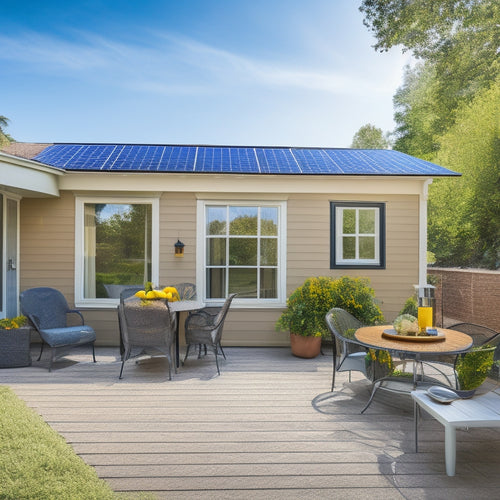
Top Solar Panel Storage Systems for Residential Use
Share
When selecting a top solar panel storage system for your residential use, you'll want to assess brands like Tesla, LG, and Sonnen, known for their reliability and efficiency. Evaluating your energy goals, desired level of independence, and backup power needs during outages will help guide your decision. You'll also want to prioritize compatibility with your existing solar panel setup and inverter, as well as high depth of discharge for maximum energy access. With various battery types and capacities available, understanding your energy needs, budget, and maintenance preferences will lead you to the best-suited solution - and exploring further will reveal the perfect fit for your unique situation.
Key Takeaways
- Research top brands like Tesla, LG, and Sonnen, considering reliability, efficiency, and unique features that meet your energy goals and needs.
- Evaluate key features, including backup power, compatibility with existing solar panels, high depth of discharge, and advanced grid management capabilities.
- Choose the right battery type and capacity based on energy needs, budget, and maintenance level, considering lithium-ion, lead-acid, and other options.
- Consider the total system cost, installation timeline, and financing options, as well as federal and state incentives to offset upfront costs.
- Ensure energy efficiency and safety by selecting a system with high round-trip efficiency, energy management capabilities, and smooth system integration.
Top Brands for Home Energy
When it comes to utilizing solar energy for your home, choosing the right brand for your energy storage system is crucial.
You'll want to research and compare top brands to guarantee you're getting a reliable and efficient system.
In your search, you'll likely come across brands like Tesla, LG, and Sonnen, each with their own unique features and benefits.
To make an informed decision, consider reading consumer reviews and brand comparisons.
Websites like EnergySage and SolarReviews provide useful perspectives from homeowners who've already invested in solar energy storage systems.
Key Features to Consider
Several significant factors come into play when evaluating solar panel storage systems for residential use. As you assess your options, you'll want to think about your energy goals and what you need from a storage system.
Are you looking for energy independence, or do you want to supplement your grid power with renewable energy? Either way, you'll need a system that can provide reliable backup power during outages.
You'll also want to take into account the system's compatibility with your existing solar panel setup and inverter. Look for systems with a high depth of discharge (DOD) to guarantee you can tap into stored energy when you need it.
Grid resilience is also essential, so evaluate systems with advanced grid management capabilities. Additionally, think about the system's scalability and expandability, in case you need to add more storage or solar panels in the future.
Battery Types and Capacities
In the pursuit of reliable backup power, you'll need to evaluate the type and capacity of batteries in your solar panel storage system. Two primary types of batteries are commonly used: lithium-ion and lead-acid. Each has its advantages and drawbacks.
| Battery Type | Capacity Range | Cycle Life |
|---|---|---|
| Lithium-Ion | 2.5-12.8 kWh | 3,000-5,000 cycles |
| Lead-Acid | 1-4 kWh | 200-500 cycles |
| Lithium-Ion Phosphate | 1.5-12 kWh | 2,000-4,000 cycles |
| Saltwater | 1-10 kWh | 3,000-6,000 cycles |
Lithium-ion batteries offer high energy density, long cycle life, and low maintenance, making them a popular choice. However, they are more expensive than lead-acid batteries. Lead-acid batteries, on the other hand, are more budget-friendly but have lower energy density, shorter cycle life, and require regular maintenance. When selecting a battery type, consider your energy needs, budget, and desired level of maintenance.
Cost and Installation Factors
You've selected your battery type and capacity, now it's time to reflect on the financial and logistical aspects of your solar panel storage system. The cost of your system will depend on several factors, including the battery type, capacity, and installation complexity.
A typical residential solar panel storage system can cost between $8,000 and $15,000, with the battery component accounting for approximately 60% of the total cost.
When it comes to installation, it's important to take into account the installation timeline. A standard installation can take anywhere from a few days to several weeks, depending on the complexity of the system and the installer's workload.
Be sure to discuss the installation timeline with your chosen installer to guarantee it aligns with your needs.
Financing options are also significant to evaluate. You may be eligible for federal and state incentives, which can help offset the upfront cost.
Additionally, many installers offer financing options, such as loans or power purchase agreements, to help make your solar panel storage system more affordable.
Carefully review your financing options to make certain you're getting the best deal for your investment.
Energy Efficiency and Safety
A solar panel storage system's energy efficiency and safety are essential aspects to evaluate when investing in a residential system. You want to guarantee that your system maximizes energy production while minimizing energy loss. Look for systems with high round-trip efficiency, which measures the amount of energy stored versus the amount of energy retrieved. A higher round-trip efficiency means less energy is wasted, resulting in greater overall efficiency.
When evaluating energy efficiency, consider the system's energy management capabilities. Can it optimize energy production and storage based on your energy usage patterns and weather forecasts? Does it have advanced features like load shifting and peak shaving to reduce your energy bills? A system that can effectively manage energy will help you get the most out of your solar panel investment.
System integration is also critical for energy efficiency and safety. Ascertain that the storage system is seamlessly integrated with your solar panels, inverter, and grid connection. This will enable smooth and efficient energy flow, reducing the risk of electrical faults and guaranteeing your system operates within safe parameters.
Frequently Asked Questions
Can I Use My Solar Panel System During a Power Outage?
You can't use your solar panel system during a power outage unless it's equipped with a battery backup or grid-tie inverter, ensuring power outage preparedness and maximizing solar panel benefits, like energy independence and reduced reliance on the grid.
How Long Do Solar Panel Storage Systems Typically Last?
As you maneuver the twists and turns of energy independence, you wonder how long your trusty solar panel storage system will be your loyal companion. Typically, its battery lifespan ranges from 5 to 15 years, with energy capacity degrading over time, but quality systems can still retain 80% capacity after a decade.
Are Solar Panel Storage Systems Environmentally Friendly?
You'll find that solar panel storage systems offer significant sustainability benefits, as they reduce your reliance on fossil fuels, ultimately decreasing your carbon footprint and promoting a cleaner environment, making them an environmentally friendly choice for your energy needs.
Can I Monitor My Energy Usage and Storage Remotely?
You're in the driver's seat, literally, when it comes to monitoring your energy usage and storage remotely. With remote access, you can track your energy production and consumption in real-time, making adjustments on the fly to optimize your energy tracking and storage needs.
Do Solar Panel Storage Systems Require Regular Maintenance?
You'll need to perform routine checks on your solar panel storage system to guarantee peak performance, as neglecting maintenance can reduce battery lifespan and elevate maintenance costs, ultimately affecting your energy independence and savings.
Related Posts
-

Why You Need a Phone Mount for Navigation
When you're on the road, a reliable phone mount is not just a convenience, it's a safety necessity that helps you mai...
-

10 Tips to Buy Affordable Solar Panels Online
When purchasing affordable solar panels online, you'll want to research reputable retailers, compare prices, and chec...
-

Step-by-Step Guide to Converting Your Vehicle to EV
You'll begin by evaluating your vehicle's conversion potential, analyzing its weight, aerodynamics, and powertrain co...


